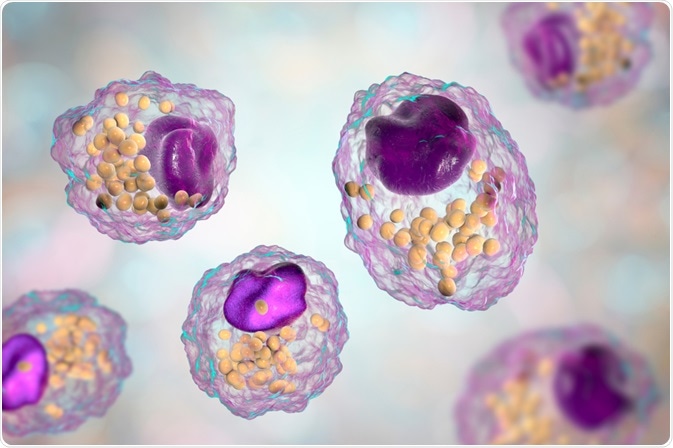One of the hallmarks of cancer is an altered lipid metabolism. Lipids are highly complex molecules that play important roles as a structural component of membrane walls as well as acting as a source of energy and as signaling molecules.
 Image Credit: Kateryna Kon / Shutterstock.com
Image Credit: Kateryna Kon / Shutterstock.com
Research has shown that the establishment of tumorous cells, as well as their rapid proliferation, are supported by the synthesis or increased uptake of lipids. The altered lipid metabolism influences different stages of the disease, which we discuss below.
Lipid metabolism in cancer
Tumors require substantial and reliable sources of energy to feed their uncontrolled, abnormal cell growth. Usually, cells hydrolyze glucose via the process of glycolysis to obtain a source of adenosine triphosphate (ATP), which provides energy for the cell. This process is an aerobic reaction, requiring a supply of oxygen.
Studies have shown that tumors have adapted to survive in harsh environments and obtain a significant amount of energy by favoring the process whereby glycolysis is performed under anaerobic conditions.
Healthy cells do this too, but this only occurs in the absence of oxygen. In contrast, evidence shows that tumor cells favor the anaerobic reaction even when oxygen is available. It is suggested that this preference for anaerobic respiration is a strategy to conserve the carbon molecules in glucose, which are exhausted with aerobic respiration, for the purpose of using this spared carbon source to help the proliferating tumor accumulate biomass.
In choosing anaerobic glycolysis, the tumor has an abundance of carbon-based precursors of lipids, and other biomolecules used as cellular building blocks such as amino acids and nucleic acids, to help it grow.
Evidence has indicated that the synthesis of fatty acids, as well as proteins and nucleic acids, is unregulated in cancer. Supporting the hypothesis that tumors opt for anaerobic respiration in order to retain these sources that are vital for cell growth. Lipids and fatty acids, for example, are used to construct the lipid bilayer membrane of new cells. These molecules are also implicated in cell signaling that is vital for tumor survival.
The modified lipid metabolism viewed in cancer is highly likely to be due to the reliance on these molecules for the establishment and growth of new cancer cells, helping the tumor to proliferate and thrive.
Lipids support cancer
As discussed above, the augmented lipid metabolism seen in cancer is considered to be closely linked to tumor growth. Research has concluded that tumor tissues have characteristic lipid compositions that are distinct from healthy tissue samples. Studies have also demonstrated that these lipid compositions differ depending on the stage of the tumor and its malignancy characteristics.
Above, we discussed the essential role of lipids in creating the structure of the cell by synthesizing the lipid bilayer membrane, a function that is vital to supporting the growth of tumors by supporting the establishment of new cells. In addition to their role in supporting the structural integrity of these newly forming cells, it is also presumed that lipids also play an active role in cancer.
For example, one group of lipids, known as the sphingolipids, have been shown to promote the survival of newly formed tumor cells. Studies have shown that inhibition of fatty acid synthesis, particularly inhibition of sphingolipid synthesis, has the impact of restricting tumor growth. This evidence further supports the active role of lipids in supporting tumorigenesis and promoting tumor survival.
Another role of lipids in cancer is that they have exogenous influence in promoting both tumorigenesis and metastasis. A wide body of evidence has demonstrated the link between diets with high lipid content and increased tumor growth and/or metastasis.
Studies have suggested that high-fat diets may promote cancer and that some lipids in particular, such as cholesterol and palmitic acid may be particularly instrumental in promoting tumor growth and/or metastasis.
Lipids as signaling mediators
Finally, we explore the role of lipids as signaling mediators in cancer. Lipids form part of the structure of a number of signaling hormones and growth factors such as lysophosphatidic acid, prostaglandins, and steroid hormones.
Studies have shown that lysophosphatidic acid, a phospholipid derivative, plays an essential role in activating cell proliferation, as well as cell survival and migration. Evidence has uncovered the link between dysregulated lysophosphatidic acid expression and tumorigenesis.
Further to this, autotaxin, the enzyme implicated in the synthesis of lysophosphatidic acid, is related to increased levels of tumor invasiveness and proliferation. In addition, the overexpression of autotaxin and lysophosphatidic acid receptors has been associated with a range of cancer types, including breast cancer, glioblastoma, and prostate cancer. Also, lysophosphatidic acid has been reported to activate MMP-9 signaling in the liver and promote cancer cell division.
Overall, there is much evidence to show the key roles lipids play in promoting cancer. However, continued research is needed to allow scientists to develop more effective therapies for treating cancer and improving prognoses.
Sources
Baenke, F., Peck, B., Miess, H. and Schulze, A., 2013. Hooked on fat: the role of lipid synthesis in cancer metabolism and tumour development. Disease Models & Mechanisms, 6(6), pp.1353-1363. https://dmm.biologists.org/content/6/6/1353
Butler, L., Perone, Y., Dehairs, J., Lupien, L., de Laat, V., Talebi, A., Loda, M., Kinlaw, W. and Swinnen, J., 2020. Lipids and cancer: Emerging roles in pathogenesis, diagnosis and therapeutic intervention. Advanced Drug Delivery Reviews. https://www.sciencedirect.com/science/article/pii/S0169409X20300971
Snaebjornsson, M., Janaki-Raman, S. and Schulze, A., 2020. Greasing the Wheels of the Cancer Machine: The Role of Lipid Metabolism in Cancer. Cell Metabolism, 31(1), pp.62-76. https://www.cell.com/cell-metabolism/pdf/S1550-4131(19)30617-5.pdf
Yan Lim, J. and Yee Kwan, H., 2020. Roles of Lipids in Cancer. Advances in Lipid Metabolism. www.intechopen.com/.../roles-of-lipids-in-cancer
Last Updated: Dec 21, 2020